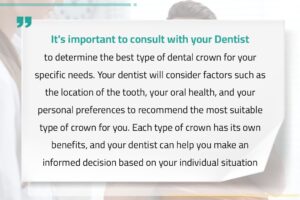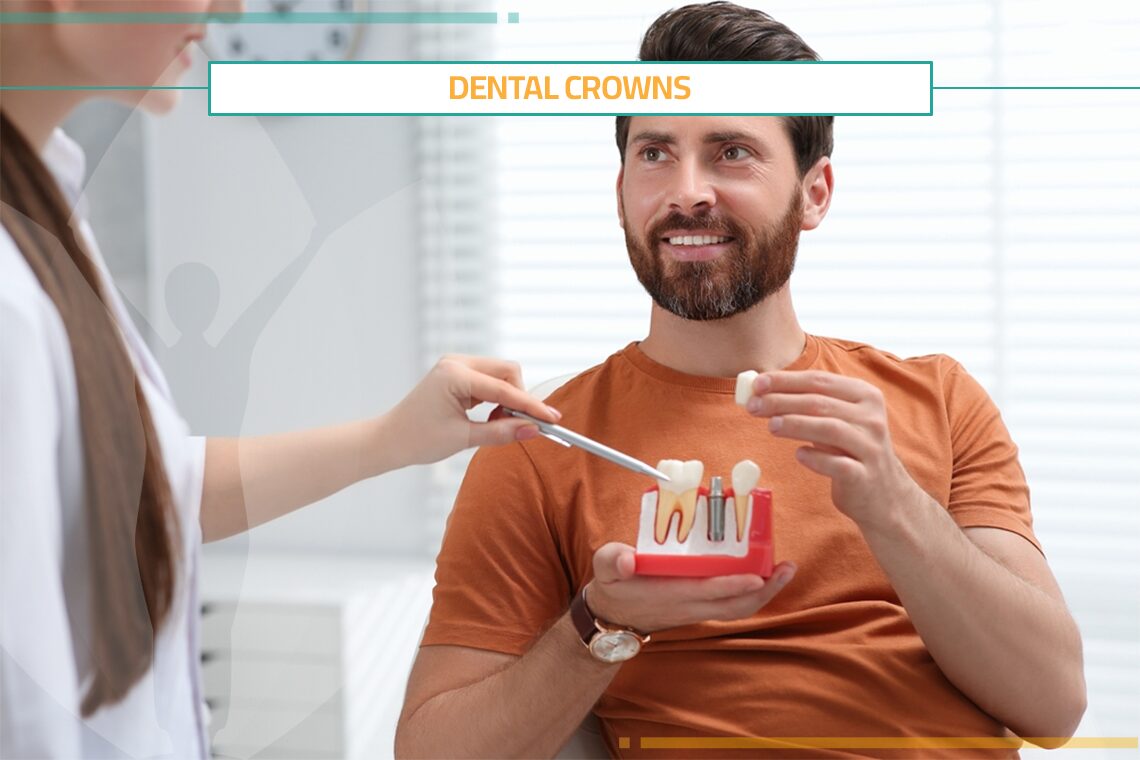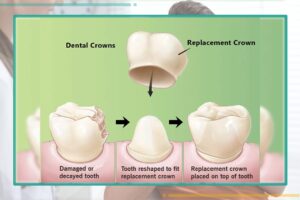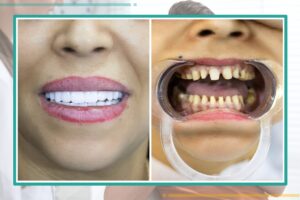Get Perfect Dental Crowns
Dental crowns are an essential part of restorative dentistry, providing both functional and aesthetic benefits to patients. They are commonly used to repair damaged or decayed teeth, restore proper tooth alignment. Indeed, they improve the overall appearance of a smile. When a tooth is severely damaged or weakened, a dental crown can help protect and restore its shape, strength, and function. Additionally, dental crowns can be used to cover dental implants, support dental bridges, and enhance the appearance of misshapen or discolored
What are Dental Crowns?
Dental crowns, also known as teeth caps, are prosthetic restorations that are custom-made to cover the entire visible portion of a tooth. They are typically made from various materials, including porcelain, ceramic, metal alloys, or a combination of materials. These materials are chosen based on the specific needs and preferences of the patient, as well as the location of the crown in the mouth. The selection of the material for a dental crown is crucial, as it impacts both the durability and esthetics of the restoration.
Uses of Dental Crowns
Dental crowns have a wide range of uses in restorative dentistry. In addition to repairing damaged or decayed teeth, dental crowns can be used for:
- Protecting a weak tooth: If a tooth is severely decayed or broken, a dental crown can provide strength and support to prevent further damage.
- Restoring a tooth after root canal treatment: After a root canal procedure, a dental crown is often placed on the treated tooth to protect it and restore its function.
- Supporting a dental bridge: Dental crowns are used to anchor dental bridges, which replace one or more missing teeth by bridging the gap between existing teeth.
- Covering dental implants: Dental crowns are used to cover dental implants, which are artificial tooth roots that are surgically placed into the jawbone to replace missing teeth.
- Enhancing the appearance of misshapen or discolored teeth: Dental crowns can be used to improve the aesthetics of teeth that are crooked, misshapen, or heavily discolored.
The Process of Getting Teeth Caps
- The process of getting a dental crown typically involves multiple steps and visits to the dentist. First, the dentist will examine and assess the tooth that needs a crown. They will determine if a dental crown is the appropriate treatment option and discuss the available materials and options with the patient. Once the decision is made to proceed with a dental crown, the tooth will be prepared by removing any decay and shaping it to accommodate the crown.
- An impression of the prepared tooth and the surrounding teeth will be taken to create a custom-made crown that fits precisely. The impression is sent to a dental laboratory where the crown will be fabricated. The dental laboratory will use the chosen material, such as porcelain or metal alloys, to create the crown according to the specifications provided by the dentist.
- Once the crown is ready, the patient will return to the dentist for the final placement. During this visit, the dentist will test the fit of the crown and make any necessary adjustments. Once the fit is confirmed, the dentist will permanently cement the dental crown onto the prepared tooth, ensuring that it provides a seamless fit and restores both function and aesthetics.
How Does It Go?
Overall, dental crowns are versatile and effective restorative options for various dental conditions. They can be used to protect and strengthen weakened teeth, restore functionality after root canal treatment or dental implants, support dental bridges, and enhance the appearance of misshapen or discolored teeth. They are custom-made to ensure a precise fit and can be created from various materials, including porcelain or metal alloys.
The materials used for dental crowns have improved greatly over the years, providing patients with more options in terms of aesthetics and durability. In recent years, there have been significant advancements in dental crown materials and technology. These advancements have resulted in improved aesthetics, durability, and biocompatibility of dental crowns. Dental crowns play a crucial role in restorative dentistry, providing patients with versatile and effective solutions for various dental conditions.
Are you interested to know more details about Hollywood Smile
The Advancements in Dental Crown Materials and Technology
The field of restorative dentistry has seen significant advancements in dental crown materials and technology in recent years. These advancements have led to improved aesthetics, durability, and biocompatibility of dental crowns, making them an even more effective solution for various dental conditions.
One of the key advancements in dental crown materials is the use of zirconia. Zirconia has emerged as a popular choice for dental crowns due to its exceptional properties. Zirconia is a type of dental ceramic that offers several advantages when used as a dental biomaterial. It is highly biocompatible, meaning it is well-tolerated by the human body.
Additionally, zirconia has a high fracture toughness, which means it is resistant to cracks and fractures, making it ideal for dental crowns that need to withstand the forces of biting and chewing. Furthermore, zirconia is radiopaque, which means it can be easily detected on dental X-rays, allowing for accurate diagnosis and monitoring of the tooth and surrounding structures. Another important advancement in dental crown materials is the use of porcelain.
Dental Crowns Types
When it comes to the types of dental crowns, there are several options available, each with its own unique characteristics and advantages. Some of the most common types of dental crowns include:
- Porcelain Crowns: These crowns are known for their natural appearance, making them a popular choice for front teeth. They can be color-matched to the surrounding teeth, providing a seamless and aesthetically pleasing result.
- Metal Crowns: These crowns are highly durable and are often used for molars and premolars due to their strength. They are resistant to wear and tear and are less likely to chip or break.
- Zirconia Crowns: Zirconia crowns are known for their strength and biocompatibility. They are a great option for anyone concerned about metal allergies and are suitable for both front and back teeth.
- Porcelain-Fused-to-Metal Crowns: These crowns combine the strength of metal with the natural appearance of porcelain, making them a versatile choice for various teeth in the mouth.
- All-Ceramic Crowns: These crowns are entirely made of ceramic material, providing excellent aesthetics and strength. They are a popular choice for those looking for a metal-free option.

Dental crowns play a crucial role in restorative dentistry. The availability of different types of crowns allows for personalized treatment that addresses various dental concerns. Whether you need to repair a damaged tooth, protect a weak tooth, or enhance the appearance of your smile. There is a dental crown type that can meet your needs. With advancements in materials and technology, dental crowns continue to provide patients with durable and aesthetic. In addition to functional solutions for their dental restoration needs.
Dental Crown Cost
Considering dental crown cost in Turkey, many patients opt to travel to Turkey for dental treatments due to the high quality of care offered at a more affordable price compared to other countries. The cost of a dental crown in Turkey can vary depending on the type of crown and the dental clinic. It is important to research and compare different dental clinics in Turkey to find one that meets your needs and budget. Additionally, many dental clinics in Turkey offer package deals that may include accommodation and local transportation, making the overall cost of treatment more attractive.
When it comes to the types of dental crowns available in Turkey, you can expect to find a range of options including porcelain crowns, metal crowns, zirconia crowns, porcelain-fused-to-metal crowns, and all-ceramic crowns. Each type of crown comes with its own benefits and cost. So, it’s essential to discuss your options with the dental clinic and understand the cost implications before proceeding with the treatment.
It’s important to note that while the cost of dental crowns in Turkey may be more affordable. It is crucial to ensure that the dental clinic and professionals meet the necessary standards for safety, quality, and expertise. Look for clinics with experienced dentists and positive patient reviews to ensure that you receive the best possible care.
Overall, considering the cost of dental crowns in Turkey along with the quality of care and range of options available. It can be a viable option for those seeking effective and affordable dental treatment.
Read about Hunch Back and its causes and treatments
The Benefits of Zirconia Crowns
Zirconia crowns have emerged as a popular choice for dental crowns due to their exceptional properties and benefits. The use of zirconia as a dental biomaterial offers several advantages. It`s an excellent option for individuals seeking durable and aesthetically pleasing dental restorations.
Advantages of Zirconia Crowns
- Exceptional Strength and Durability
Zirconia crowns are known for their high strength and durability, making them ideal for withstanding the forces of biting and chewing. These crowns are highly resistant to cracks and fractures, providing long-lasting functionality and protection for the affected tooth.
2. Biocompatibility
Zirconia is highly biocompatible, meaning it is well-tolerated by the human body. This property reduces the risk of allergic reactions or adverse tissue responses. It makes zirconia crowns a safe choice for individuals with sensitivities to metal alloys.
3. Natural Appearance
Zirconia crowns can be custom-made to closely resemble the natural color and translucency of neighboring teeth, resulting in a seamless and aesthetically pleasing outcome. The ability to blend with existing teeth makes zirconia crowns a popular choice for both front and back teeth.
4. Radiopacity
One of the notable advantages of zirconia is its radiopacity, which allows for easy detection on dental X-rays. This property enables accurate diagnosis and monitoring of the treated tooth and surrounding structures, enhancing the overall dental care and treatment planning.
Conclusion
The widespread availability of zirconia crowns as a dental restoration option reflects the continual advancements in dental crown materials and technology. With their exceptional strength, biocompatibility, natural appearance, and radiopacity, zirconia crowns offer a reliable and aesthetically pleasing solution for individuals seeking durable and effective dental restorations.
When considering dental crown options, it is essential to consult with your dentist to determine the most suitable type of crown for your specific needs. By exploring the benefits of zirconia crowns and understanding their unique properties. You can make an informed decision in collaboration with your dental care provider.







